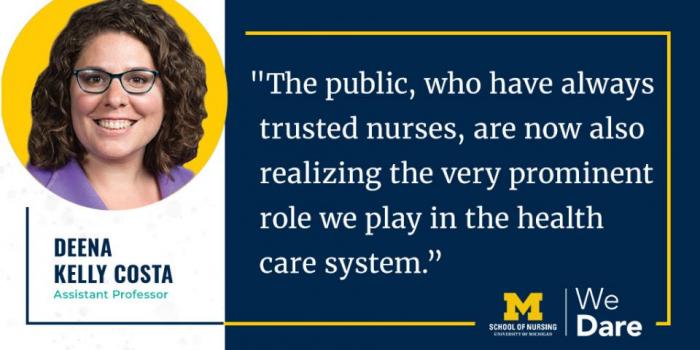Assistant Professor Deena Kelly Costa works with governor’s office to inform state response to COVID-19 pandemic
As health care professionals around the world continue providing care to patients amid unprecedented circumstances, we will explore how the U-M School of Nursing faculty is deploying its breadth of knowledge and clinical experience during the COVID-19 pandemic. Many U-M School of Nursing faculty members are taking on new challenges caring for patients in communities across the state of Michigan …

Michigan is battling one of the worst COVID-19 outbreaks in the country. The state is looking to health care experts to coordinate an informed response, and Assistant Professor Deena Kelly Costa, Ph.D., RN, FAAN, has been assisting Governor Gretchen Whitmer’s office to inform policies that can improve nursing practice on the front lines.
Costa’s research focuses on health care workforce issues, specifically in ICU teams. She has drawn on her clinical expertise as an adult ICU nurse and extensive knowledge of Michigan’s nursing structure to inform the development of a multifaceted executive order providing relief from scope of practice restrictions for nurse practitioners, certified registered nurse anesthetists and licensed practical nurses. Additionally, the order authorizes RNs to conduct COVID-19 testing without physician orders, gives all health care students eligibility to work in a health facility, and permits medical students to function as respiratory therapist extenders.
“Nurses are ready and able to meet the needs of the public,” Costa said. “Suspending scope of practice laws so that nurses can practice to the fullest extent of their education and training gives our profession all the tools to lead in caring for the public during this tumultuous time.”
The state has also developed a new volunteer website, where experienced professionals and others can volunteer to support the health care workforce as the pandemic evolves. Costa, along with colleagues from the U-M Institute for Healthcare Policy and Innovation (IHPI), helped create the questions that are being used to evaluate nurses and other health care volunteers.
Developing an effective response to COVID-19 requires decisive action, so when the governor’s office asked Costa to advise on nursing-related matters, things moved quickly.
“Within five minutes of agreeing to advise, I was speaking to the special counsel over the phone and describing nursing practice broadly, then I began answering specific questions which helped inform the executive order language,” she explained.
Costa was honored to be able to provide expert commentary on this important issue. She knows it’s just one of the many ways nurses are being looked to for leadership in unprecedented circumstances.
“Nurses are showing the diverse skills, leadership and expertise they have now more than ever,” Costa said. “Not only are they risking their health and safety by caring for patients diagnosed with COVID-19, they’re also informing policy, leading hospitals’ emergency planning and using all their clinical and research expertise to help in this crisis.”
Nursing is already recognized as the most trusted profession in America, and as the country battles COVID-19, that public trust is being reflected in public policy.
“Nurses are stepping up all over the state and the globe,” she said. “The public, who have always trusted nurses, are now also realizing the very prominent role we play in the health care system. Nurses will continue to show up for their patients, their communities and their colleagues. And we will continue to innovate in all areas so we can tackle this crisis.”





